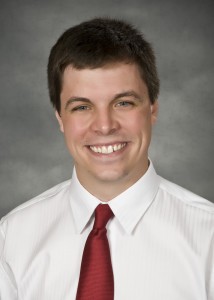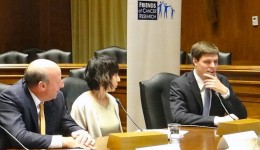
William Elder Jr. is in his third year at the Wright State Boonshoft School of Medicine and wants to be a doctor in family medicine.
William Elder Jr., a Wright State University Boonshoft School of Medicine student, will attend the State of the Union Address tonight as a guest of First Lady Michelle Obama.
Elder, a third-year medical student who plans to become a family physician, was not expected to live long when he was first diagnosed with cystic fibrosis at 8 years old. However, an innovative treatment using Kalydeco, a precision medicine, or personalized medicine that treats the G551D mutation, enabled him to pursue his dream of going to medical school.
Elder was contacted by the White House Office of Science and Technology late Sunday afternoon. “I was just blown away at that point,” he said. “I am extremely humbled.”
The White House originally contacted the Cystic Fibrosis Foundation, an organization Elder has been involved with throughout the years. Elder was part of a panel in July 2013 that spoke in front of a congressional briefing hosted by Friends of Cancer Research to educate members of the U.S. Senate about new processes developed by the FDA to speed the approval of breakthrough therapies. The Cystic Fibrosis Foundation recommended Elder to the White House as a person who exemplifies precision medicine. Precision medicine works on the individual genotype, or underlying genetic factors of that specific person.

Wright State medical student William Elder Jr., right, shared his experience as a patient with cystic fibrosis to members of Congress in a briefing in Washington, D.C., in 2013.
Elder is excited about the invitation. “Everything has been a whirlwind,” said Elder, who is in a family medicine clerkship at the Boonshoft School of Medicine.
He flew to Washington on Monday night after clinic. His father William Elder Sr. joined him.
Donald Clark, M.D., Elder’s supervising physician in the family medicine clerkship and assistant professor in the Department of Medicine at the Boonshoft School of Medicine, is excited for Elder.
“This is a tremendous honor for Bill and Wright State University,” Clark said. “Bill will make an excellent family physician. He recognizes the importance of primary care in the development of this country’s health care system.”
Elder is committed to family medicine. He is concerned about the shortage of family medicine doctors. “Family medicine enables comprehensive care, continuity of care and the opportunity to practice preventative medicine,” he said.

 Milling around
Milling around  Wright State recognizes Nursing Professor Kim Ringo for advancing international student success
Wright State recognizes Nursing Professor Kim Ringo for advancing international student success  Wright State honors graduating students for distinguished doctoral dissertations
Wright State honors graduating students for distinguished doctoral dissertations  Top 10 Newsroom videos of 2025
Top 10 Newsroom videos of 2025  Museum-quality replica of historic Hawthorn Hill donated to Wright State
Museum-quality replica of historic Hawthorn Hill donated to Wright State 